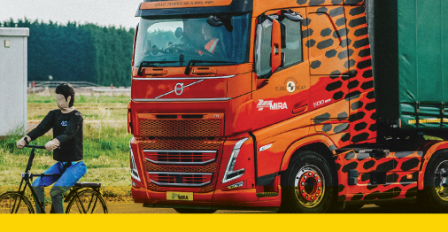Euro NCAP has officially announced a major milestone in the development towards a Truck Safe rating scheme.
To this end, at NCAP24, in front of an audience of international road safety experts and industry, the safety rating body plans showcase its current considerations for a future Truck Safe rating and how it intends to evaluate and benchmark truck performance.
In a statement released on Wednesday, Euro NCAP described the move as a direct response to data showing that while trucks represent only 3% of vehicles on Europe’s roads they are involved in almost 15% of all EU road fatalities.
Euro NCAP’s future rating scheme is designed to go further and faster than current EU truck safety regulations, while also driving innovation and balancing the needs of the different commercial vehicle sectors across Europe.
However, Dr. Michiel van Ratingen, Secretary General Euro NCAP, data shows there is a disproportionate number of a truck-related fatality across Europe and that rucks play a vital role in a vibrant and productive economy.
“At NCAP24,” he explained, “we are delighted to be joined by key stakeholders in the industry and vehicle manufacturers including DAF, Scania, Volvo, and ZF who are demonstrating their state-of-the-art technologies. By publicly presenting the procedures and requirements ahead of the rating, we hope that the industry will take note and react accordingly.
“The protocols announced today will be formally published next month and demonstrate that best practice test methods developed over the last decade for passenger cars can be turned into useful guidelines for the design of future, safer heavy trucks.”
Euro NCAP on Wednesday, highlighted the need for trucks to be better equipped with life-saving technologies, particularly related to crash avoidance, vision, and aspects of post-crash rescue.
“Sadly, when trucks are involved in crashes, their size and weight mean there is a greater risk of fatalities – especially for more vulnerable road users (VRUs),” he lamented. Adding, ”Today marks a significant moment in the development of Euro NCAP’s Truck Safe rating scheme.”
Also commenting, Matthew Avery, Director of Strategy Development Euro NCAP recalled that over the past 12 months, Euro NCAP had worked closely with vehicle manufacturers to develop the tests and consulted with different stakeholders across Europe including distributors, hauliers, insurers, city authorities, legislators, and strategic road organisations to fully understand the complexities of making trucks and roads safer.
“However,” he said, “our aim is to progress towards best practices in all types of vehicle safety, rather than just meeting minimum standards, a goal we have successfully achieved with passenger cars. New regulatory requirements have forced manufacturers to increase safety performance. The future Truck Safe rating will incentivise good safety performance in both cities and highways and allow optimisation of operational safety and cost.
“The approach taken by Euro NCAP is designed to highlight technologies that are both cost-effective and deliver on safety and allow operators to select the safest vehicle for a particular role. In the future, Euro NCAP will expand the programme to include crash protection as well. The new tests will emulate real-world collisions and encourage manufacturers to fit collision avoidance technologies and improve driver vision. Truck accidents vary significantly depending on the type of road environment (City or Highway) as well as the collision partner (passenger car or VRU). Accidents between trucks and vulnerable road users (VRUs) currently account for 25% of all EU fatalities.
“It’s about taking a holistic approach to making both trucks and roads safer: from driver behaviour and monitoring; to road infrastructure; to adopting assisted driving technologies currently available on cars; and looking at the structure of trucks and how they perform in accidents. There isn’t one solution. Safer roads are key to this, but it’s complex. Road transport plays an integral and vital role in our economies.
“The sooner we recognize that safety technologies on trucks lag behind those on cars, the quicker we will be able to reduce the number of fatal accidents involving trucks.”
©Copyright MOTORING WORLD INTERNATIONAL. All rights reserved. Materials, photographs, illustrations and other digital content on this website, may not be reproduced, published, broadcast, rewritten or redistributed in whole or in part without prior written permission from Motoring World International
Contact: editor@motoringworldng.com


